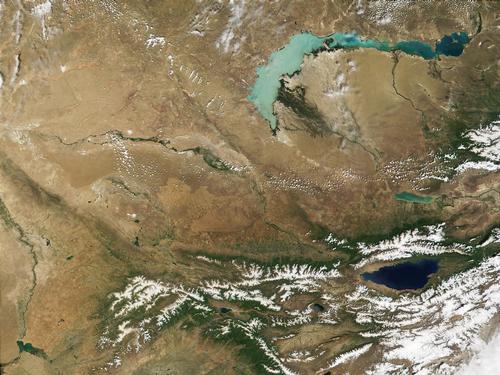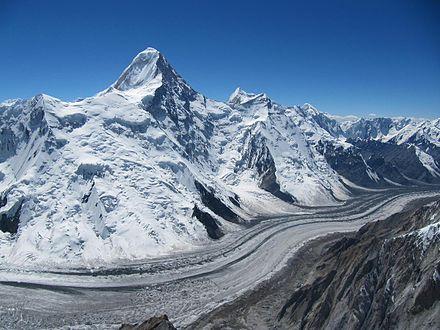KAZAKHSTAN
Geography and Landscape

Geography and Landscape
| Basic information | |
| Official language | Kazakh, Russian |
| Capital | Astana |
| Area | 2.724.900 km² |
| Population | 19,152,655 (2021) |
| Currency | tenge (KZT) |
| Web | .kz |
| Code. | KAZ |
| Tel. | +7 |

Geography and Landscape
Geography
Kazakhstan is located in Central Asia. Kazakhstan is landlocked and completely surrounded by land. It borders Russia to the north and northwest, China to the east, Kyrgyzstan, Uzbekistan and Turkmenistan to the south and the Caspian Sea to the southwest.

The surface area of Kazakhstan is 2,717,000 square kilometres. This makes Kazakhstan the ninth largest country in the world.
Landscape
Kazakhstan has great differences in altitude. High mountain ridges with eternal snow form the borders in the southeast and east while 90% of the country is flat and consists of steppe, desert or semi-desert. The highest point, Khan-Thengri (6995 metres), is in the Tian Shan Mountains, at the border triangle of Kazakhstan, Kyrgyzstan and China.
 Khan-Thengri, highest point of KazakhstanPhoto: Frederic Heymes CC BY-SA 2.0 fr no changes made
Khan-Thengri, highest point of KazakhstanPhoto: Frederic Heymes CC BY-SA 2.0 fr no changes made
The lowest point near the Caspian Sea is 132 metres below sea level. The Syr Darya, Kazakhstan's largest river, runs through the northwest of the country and ends in the Aral Sea, on the border with Uzbekistan. Lake Balkhash is another large lake in eastern Kazakhstan. The Aral Sea is drying up. Water was taken from the Syr-Darya and Amu-Darya (rivers that flow into the Aral Sea) on a large scale to feed four hundred thousand square kilometres of wheat and barley. The lake has shrunk by 50% since then. The consequences are almost incalculable. Due to a surplus of salt, most fish species died, causing great unemployment among fishermen. Many flora and fauna disappeared and once-fertile coastal strips became infertile due to salinisation.
Climate and Weather
Kazakhstan has a continental continental climate with cold winters and hot summers. There are large regional differences. The southern region has milder winters and hotter summers than the north. The rain that falls, falls in the spring and in the winter large parts of the country are covered with snow. The most extreme temperatures are: 45 Celsius in July and -45 Celsius in January.
Plants and Animals
Plants
The steppes and deserts of Kazakhstan are sparsely covered with grass and plants that can withstand drought. Along the rivers grow reeds and different kinds of deciduous trees, such as elm and poplar. The mountain slopes in the south are covered with coniferous forests (spruce, larch), cedar and juniper.
Animals
The rare snow leopard and the saga antelope have their habitat in Kazakhstan. Both are protected species. Steppe inhabitants are foxes, badgers and birds of prey, and in the desert live gazelles, reptiles and all kinds of rodents. By rivers and lakes live wild boar, deer and jackals. In the mountains live the wild cat, the lynx, the wolf, the brown bear, the eagle and the bearded vulture. The Turkmen kulan, a rare ungulate and a subspecies of the onager (Asian wild ass), can be found on Barsa Kelmes Island in the Aral Sea.
Sources
Elmar Landeninformatie
CIA - World Factbook
BBC - Country Profiles
Copyright: Team The World of Info